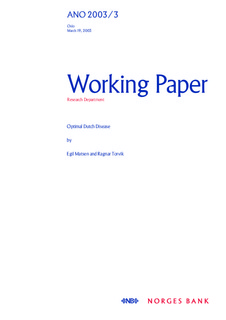Optimal Dutch Disease
Working paper
Published version
Permanent lenke
http://hdl.handle.net/11250/2498625Utgivelsesdato
2003Metadata
Vis full innførselSamlinger
Sammendrag
Growth models of the Dutch disease, such as those of Krugman (1987), Matsuyama (1992), Sachs and Warner (1995) and Gylfason et al. (1999), explain why resource abundance may reduce growth. The literature, however, also raises a new question: if the use of resource wealth hurts productivity growth, how should such wealth be optimally managed? This question forms the topic of the present paper, in which we extend the growth literature on the Dutch disease from a positive to a normative setting. We show that the assumptions in the previous literature imply that the optimal share of national wealth consumed in each period needs to be adjusted down. Some Dutch disease, however, is always optimal. Thus lower growth in resource abundant countries may not be a problem in itself, but may be part of an optimal growth path. The optimal spending path of the resource wealth may be increasing or decreasing over time, and we discuss why this is the case.

